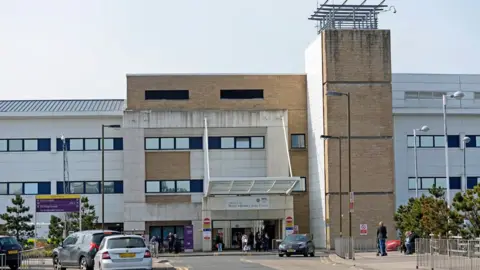Report finds safety concerns at Edinburgh maternity unit
 Getty Images
Getty ImagesMothers and newborn babies were harmed due to staff shortages and a “toxic” culture at Edinburgh’s maternity unit, a whistleblower investigation seen by BBC News has revealed.
In February this year, NHS Lothian commissioned a report from the Obstetric Triage and Assessment Unit at Edinburgh Royal Infirmary after a staff member raised concerns.
The investigation confirmed or partially confirmed 17 safety concerns.
NHS Lothian said an “improvement program” to improve patient safety and improve staff working conditions had been launched in light of the report.
NHS staff spoke to BBC News after a mother died on a maternity ward in September while a whistleblower investigation was completed.
The health board said it was conducting a detailed review of the death to provide the family with much-needed answers.
But staff said they were concerned the risk to patients remained.
An anonymous staff member told the BBC: “We are concerned that safe patient care is not being provided and that women and babies are being harmed.”
“Things have gotten worse over the past five years and now is the worst time.”
The Triage and Assessment Unit looks after pregnant women requiring urgent care and sees approximately 1,200 women each month.
The whistleblower report found patient safety was compromised by a range of factors, including staff shortages, which led to delays in women receiving treatment.
It also said women were cared for by unqualified staff and there were “toxic relationships” between managers and midwives.
The report concluded: “There is no doubt that there were safety concerns, near misses and real adverse consequences for women and babies.”
It described situations where the support provided was “inadequate” and midwives felt “professionally compromised” by staff shortages:
- A woman in labor waited several hours during the triage process before calling St John’s Hospital in Livingston herself to see if there were any spaces in its labor ward.
- On another day, 10 women were waiting for triage, and when the night shift began, 17 women were in the department. The unit has the ability to treat nine people simultaneously.
Investigators found managers falsely claimed the unit was adequately staffed, while “most midwives said the unit was understaffed on most shifts, with the least experienced staff responsible for caring for large numbers of women on an ongoing basis”.
Analysis of the rotas found frequent staffing shortages. Midwives described actual and “near misses” safety issues when staffing levels were compromised.
The report also found that prevalence rates in obstetric triage and assessment units rose by 200 per cent between April 2023 and April 2024, to 15.2 per cent.
Employees reportedly felt undervalued, disrespected, and worked under significant pressure and pressure.
One witness described an “abusive relationship between management and staff”, while others said managers showed a lack of kindness and compassion towards staff after a colleague took his own life.
Some witnesses said managers downplayed concerns, with one manager accused of “insensitive behavior at best and bullying at worst.”
Several staff said they feared the consequences of speaking out would mean making managers’ working lives difficult, such as not being granted annual leave.
The report, written by senior nursing staff, interviewed 30 witnesses, including staff who work or have worked in the maternity triage unit.
They concluded that staff shortages and sickness absence will impact on midwives’ ability to provide safe care.
They also noted increased pressure on the sector, with attendances increasing by a quarter since January 2022, leading to overcrowding and delays.
NHS Lothian deputy chief executive Jim Crombie said the mother’s death on the ward in September was under review.
He said: “A serious adverse event (SAE) team, made up of a number of experts including external clinicians, will carefully review it using normal processes and reports will be shared directly with families and services to ensure all necessary steps are taken.
“We need to await the outcome of the SAE and address any recommendations therein, and continue to take action on reported issues.
“Since concerns were raised, we have been working with staff to design an improvement plan to improve patient safety, quality of care and improve the working environment and experience for our dedicated team of staff.
“All aspects of patient care and the workforce were reviewed as well as staff working patterns, training and environment as part of an open and transparent program working with the team.”
Maternity units in Scotland will Faces frequent surprise inspections by NHS safety regulatorsHealthcare Improvement Scotland, starting in January. This is in response to a surge in neonatal deaths in recent years.



